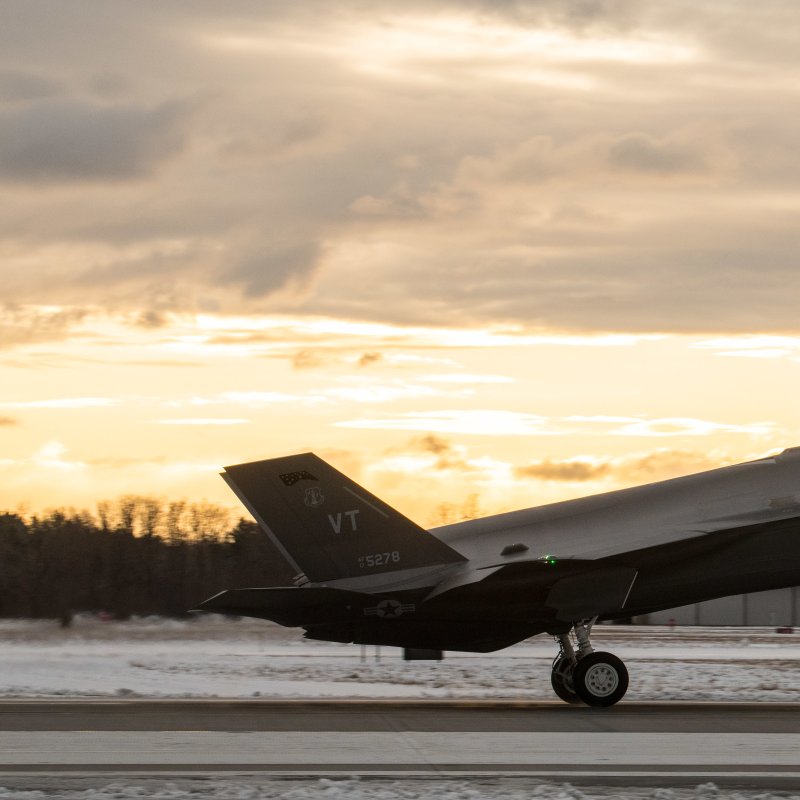Experts say deals for Lockheed Martin's F-35, pictured, are a primary cause of significant increases to foreign military sales by the U.S. government this year, and pending deals -- including one for $23 billion -- suggest sales could increase even more in 2021. File Photo by Julie M. Shea/U.S. Air National Guard
Jan. 1 (UPI) -- The United States approved a record number of foreign military sales in 2020, by its own accounting and that of arms industry observers.
According to R. Clarke Cooper, assistant secretary of the State Department's Bureau of Political-Military Affairs, the State Department approved $17.08 billion in foreign military sales in fiscal year 2020 -- a 2.8% increase over fiscal 2019.
And the three-year rolling average -- which officials say is a truer reflection of trends -- is even higher, having risen to $54 billion.
The Defense Security Cooperation Agency released those figures at the beginning of December, covering deals for weapons, aircraft and other systems made by companies including Lockheed Martin, Boeing and Northrop Grumman, among others.
But close observers of the arms trade say the data from the federal government are not complete, and the numbers should be even higher.
William Hartung, director of the arms and security program at the Center for International Policy, wrote that the DSCA's report, published for decades but not released publicly since 2017, contained several crucial omissions.
"It kind of hides more than it discloses," Hartung told UPI. "It's almost ... I'm not going to say it's useless, but it's of very minimal utility."
Notably, the DSCA's report doesn't separate foreign military sales from domestic sales. Also, in terms of foreign military sales, the report primarily measures approvals, not actual sales, Hartung said.
But both numbers were notably high this year.
"In terms of notifications to Congress of big deals, the numbers this year were huge compared to past years. I tallied up $129 billion in offers. It was the biggest year in new offers. It's much larger than other years of the Trump administration," Hartung said.
"It's a huge number in terms of new offers that will again play out. It sort of sets up the U.S. to be the dominant supplier, which we are already, but the margins are larger," he said.
The only year to exceed that was 2010, when the DSCA notified Congress of $123 billion in big arms sales, Hartung said.
Jeff Abramson, a senior fellow at the Arms Control Association, said his organization's tracker showed foreign military sales this calendar year are the highest they've been in this century.
So what brought the numbers up?
"The big difference in fiscal year 2020 was that there was $27 billion in fighter plane sales to Japan -- including $23 billion for the F-35, which is an ongoing program," Hartung said.
"So those two big deals skewed the figures a bit, accounting for almost the full difference in congressional foreign military sales notifications from fiscal year 2019 to fiscal year 2020."
Hartung noted that Japan had started an F-35 program before President Donald Trump took office, so the increase can't be attributed to the Trump administration's policies.
"It's part of the ongoing flow of arms deals that transcend administrations," Hartung said.
And from that perspective, fiscal year 2021 actually could be a bigger year for foreign military sales than 2020 -- due to a $23 billion package to sell F-35s, drones and bombs to the United Arab Emirates.
Some members of Congress have threatened to block that deal, and it's far from the only controversial sale the State Department has approved under the current administration.
Sales or arms transfers to Saudi Arabia, Egypt, the Philippines and Hungary -- some of which were approved in the last week of the year -- have also raised questions due to human rights issues in those countries.
And sales to Taiwan also worry observers due to the United States' increasingly strained relationship with China, which has threatened to retaliate over deals approved this fall.
"There's sort of a range of countries that raise alarms for those of us worried about how they might be used in terms of human rights," Abramson told UPI.
"Writ large, this administration has been horrendous for any advocates for a more responsible and sane approach to the arms trade."
And while Trump's support for some of these governments may be ideological, there's really one consistent throughline to the Trump administration's policy in terms of foreign military sales, Abramson said.
"This president seems to think that selling as many arms as possible is a success," he said.
Abramson said he is cautiously optimistic about the incoming Biden administration's arms trade policy.
He noted that re-entering the Arms Trade Treaty is a plank in the Democratic Party Platform and said there's reason to think President-elect Biden's administration will "take restraint and responsibility much more seriously."
But he also suspects the trend from this administration of Congress taking action on arms trade issues -- historically rare -- will continue.
"Even if the Democrats end up capturing the Senate, I think we'll see much more congressional action because it's a Trump administration approach," Abramson said.















